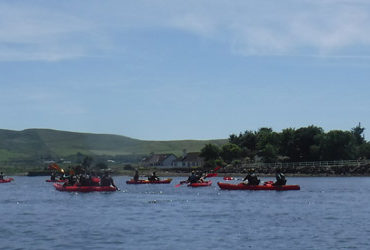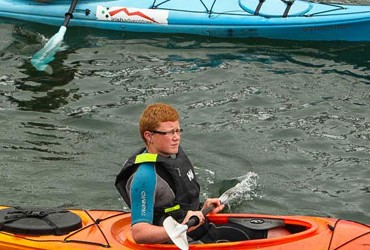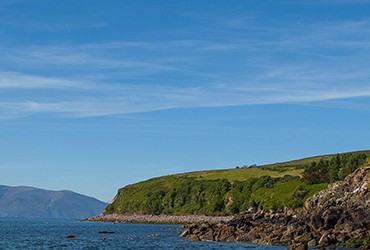For the first time in a few years, Irish language summer schools have had to find extra beds as they grow in popularity, writes Kim Bielenberg (Irish Independent 29/06/16)
The number of students attending Gaeltacht summer colleges has soared this year, spurred on by the economic recovery and a rising demand for oral skills.
According to Concos, the umbrella body for the colleges, the vast majority of June courses for school pupils were booked out.
Maria Nic Dhonnacha, spokeswoman for CONCOS, told the Irish Independent: “For the first time in a few years, the colleges have had to find extra beds, and new Mná Tí have been brought into the system to accommodate students.”
For many young teenagers, the three-week trip to the Gaeltacht has been a rite of passage – and brushing up on Irish is only a part of it. Frequently, it is a young person’s first significant trip away from home without their parents.
During the course, they may even steal their first kiss, in between uttering the cúpla focail, stomping feet at a ceilidh and eating meals of variable quality cooked by a bean an tí.
Liam Suipéal, chairman of CONCOS, said the number of students declined sharply in the recession. After hitting a peak at 28,000 during the Celtic Tiger years, numbers dropped to 22,000.
There were fears that the tradition of going to the Gaeltacht as a teenager was dying out, as families struggled to afford the trips. Gaeltacht summer colleges typically charge between €850 and €950 for a three-week course, including board and lodging.
Numbers recovered last year to 24,000, but those figures were partly boosted by a growth in the number of trainee primary teachers attending their own courses.
Suipéal, the bainisteoir at Coláiste na Rinne in the Waterford Gaeltacht, said numbers have grown again in 2016 after last year’s modest recovery.
Most colleges are dotted along the Western seaboard in Kerry, Mayo, Galway and Donegal. The Dingle peninsula has enjoyed a surge in popularity this year – possibly encouraged by the popularity of the Star Wars films.
Ciara Ní Ghairbhí of Coláistí Chorca Dhuibhne, which has six centres along the Dingle peninsula, says: “This has been our best year ever, and we are full to capacity in June and July.”
While exam students used to be able to get by with good written Irish and a grasp of grammar, now there is a growing emphasis on the spoken language.
NÍ Ghairbhí says: “With the oral part of the Leaving Cert at 40pc, students have to have experience speaking the language.”
First and second year are again the most popular years for students to attend colleges in the Gaeltacht in the summer, with many coming back year after year.
June is particularly popular during the long summer break because parents may be unsure about what to do with their 13-year-olds at that time.
Ní Ghairbhí says Leaving Cert courses are now also becoming popular as a result of the new focus on oral skills.
At most courses, students spend the morning in class and afternoons taking part in leisure activities, including sport and music.
At Leaving Cert courses, there may be more intensive language learning during the afternoons.
For a growing number of schoolchildren, the summer course may not be the only experience of a Gaeltacht college.
Class groups from primary schools are also travelling for short stints in the Gaeltacht during term time.
The summer colleges can no longer just get by with regimented language learning and strict enforcement of rules.
By the end of the school year, many students are jaded by classroom learning. So, the colleges have to offer something different. “The aim of these courses is to have a pleasant and profitable holiday in an Irish-speaking atmosphere in the Gaeltacht,” says Suipéal.
“The crucial benefit is that it helps young people to gain confidence in the spoken language by becoming immersed in it.”
According to Ní Ghairbhí, the students not only gain by brushing up on their language skills. “For many of them, it’s a huge experience going away from home, particularly if they are coming on their own,” she says. “You can see them growing in self-confidence as they make new friends.”
In order to attract students, colleges have to offer a wide variety of extra-curricular activities, and these are becoming more elaborate every year. Coláiste Uisce in Belmullet, Co Mayo, has become popular for its range of watersports, including sailing, surfing, kayaking, pier jumping and raft building. There is also indoor climbing and archery.
Coláiste Lurgan in Inverin in Co Galway became renowned for the YouTube music videos recorded by students and staff.
The school’s version of the Avici song ‘Wake Me Up’ attracted 4 million hits on the video channel.
Overall, students are given less freedom to roam down the boreens and along beaches without supervision as colleges are forced to comply with rigorous health and safety standards.
At the same time, the colleges are less regimented than they once were, and teachers try to make the classes as interactive as possible, according to Ní Ghairbhí.
At Coláistí Chorca Dhuibne they live by the old Irish proverb: “Is fearr Gaeilge bhriste ná Béarla cliste.” (broken Irish is better than clever English).
“The main thing is that the students make an effort to speak the language,” says Ní Ghairbhí.
“If they don’t speak Irish, they are given a warning, then we ring their parents, and then if that continues, they are sent home. It only really happens if they are blatantly not making any effort at all.”
For some students, the stint in the Gaeltacht is a form of digital detox. The Mná Ti gather up the phones of the teenagers and they are only given access to them at certain times of the day. Of course, teenagers know to get round this, and have been known to bring two phones in order to bypass the regulations.
In recent years, there has been mounting concern that students from less well-off backgrounds are being put at a disadvantage, because they have less opportunity to use their Irish in the Gaeltacht.
This inequality has been heightened because of the increase in marks for oral language.
The National Council for Curriculum and Assessment (NCCA) recommends that Junior Cert students should attend Irish language summer schools, but many families cannot afford the fees.
Irish Independent





